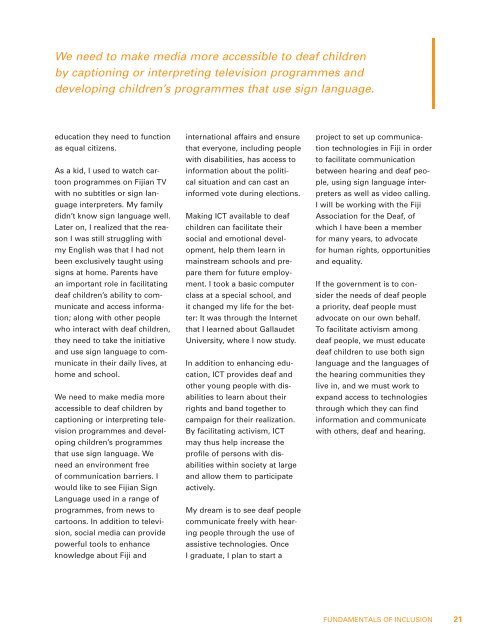Children with Disabilities
Children with Disabilities
Children with Disabilities
You also want an ePaper? Increase the reach of your titles
YUMPU automatically turns print PDFs into web optimized ePapers that Google loves.
We need to make media more accessible to deaf children<br />
by captioning or interpreting television programmes and<br />
developing children’s programmes that use sign language.<br />
education they need to function<br />
as equal citizens.<br />
As a kid, I used to watch cartoon<br />
programmes on Fijian TV<br />
<strong>with</strong> no subtitles or sign language<br />
interpreters. My family<br />
didn’t know sign language well.<br />
Later on, I realized that the reason<br />
I was still struggling <strong>with</strong><br />
my English was that I had not<br />
been exclusively taught using<br />
signs at home. Parents have<br />
an important role in facilitating<br />
deaf children’s ability to communicate<br />
and access information;<br />
along <strong>with</strong> other people<br />
who interact <strong>with</strong> deaf children,<br />
they need to take the initiative<br />
and use sign language to communicate<br />
in their daily lives, at<br />
home and school.<br />
We need to make media more<br />
accessible to deaf children by<br />
captioning or interpreting television<br />
programmes and developing<br />
children’s programmes<br />
that use sign language. We<br />
need an environment free<br />
of communication barriers. I<br />
would like to see Fijian Sign<br />
Language used in a range of<br />
programmes, from news to<br />
cartoons. In addition to television,<br />
social media can provide<br />
powerful tools to enhance<br />
knowledge about Fiji and<br />
international affairs and ensure<br />
that everyone, including people<br />
<strong>with</strong> disabilities, has access to<br />
information about the political<br />
situation and can cast an<br />
informed vote during elections.<br />
Making ICT available to deaf<br />
children can facilitate their<br />
social and emotional development,<br />
help them learn in<br />
mainstream schools and prepare<br />
them for future employment.<br />
I took a basic computer<br />
class at a special school, and<br />
it changed my life for the better:<br />
It was through the Internet<br />
that I learned about Gallaudet<br />
University, where I now study.<br />
In addition to enhancing education,<br />
ICT provides deaf and<br />
other young people <strong>with</strong> disabilities<br />
to learn about their<br />
rights and band together to<br />
campaign for their realization.<br />
By facilitating activism, ICT<br />
may thus help increase the<br />
profile of persons <strong>with</strong> disabilities<br />
<strong>with</strong>in society at large<br />
and allow them to participate<br />
actively.<br />
My dream is to see deaf people<br />
communicate freely <strong>with</strong> hearing<br />
people through the use of<br />
assistive technologies. Once<br />
I graduate, I plan to start a<br />
project to set up communication<br />
technologies in Fiji in order<br />
to facilitate communication<br />
between hearing and deaf people,<br />
using sign language interpreters<br />
as well as video calling.<br />
I will be working <strong>with</strong> the Fiji<br />
Association for the Deaf, of<br />
which I have been a member<br />
for many years, to advocate<br />
for human rights, opportunities<br />
and equality.<br />
If the government is to consider<br />
the needs of deaf people<br />
a priority, deaf people must<br />
advocate on our own behalf.<br />
To facilitate activism among<br />
deaf people, we must educate<br />
deaf children to use both sign<br />
language and the languages of<br />
the hearing communities they<br />
live in, and we must work to<br />
expand access to technologies<br />
through which they can find<br />
information and communicate<br />
<strong>with</strong> others, deaf and hearing.<br />
FUNDAMENTALS OF INCLUSION<br />
21


